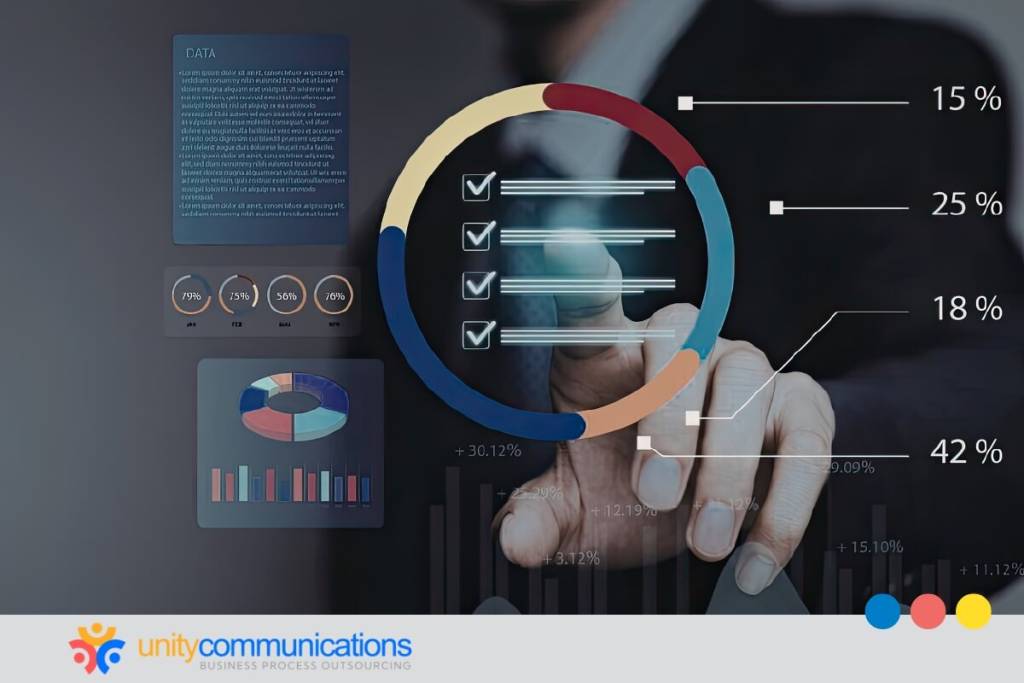IN THIS ARTICLE
Table of Contents
Data analytics is transforming industries by enabling data-driven decisions and uncovering actionable insights. The outsourcing sector, in particular, has experienced a paradigm shift, with data analytics playing a pivotal role in enhancing decision-making, operational efficiency, and competitiveness.
Business process outsourcing (BPO) is no longer confined to cost-saving measures but has become a strategic enabler for businesses looking to develop analytics capabilities. This article delves into how data analytics in outsourcing is revolutionizing the landscape, from improving business operations to addressing challenges such as data security and integration.
Introduction to data analytics in the context of outsourcing

Data analytics in outsourcing refers to an outsourcing company’s application of analytics tools and methodologies to process big data and provide actionable insights for better business outcomes.
According to Mordor Intelligence, the data analytics outsourcing market size is estimated at $10.89 billion in 2025 and could reach $47.65 billion by 2030. This underscores various industries’ increasing reliance on analytics outsourcing to manage vast datasets and gain competitive advantages.
What BPO brings is more than the tools and expertise in data processing. It also offers robust strategies to use analytics capabilities to drive informed decisions and transform business processes. BPO partners offer comprehensive data analytics services to keep companies ahead in an increasingly data-driven world.
Benefits of incorporating data analytics into outsourcing strategies
Incorporating data analytics into outsourcing strategies is a pivotal approach for businesses aiming to thrive in competitive markets. By leveraging analytics outsourcing, organizations can unlock unparalleled benefits that enhance decision-making, optimize operations, and drive innovation.
Below are the primary advantages of integrating data analytics into outsourcing arrangements:
Enhanced decision-making
In today’s dynamic business environment, making data-driven decisions is crucial. Analytics outsourcing gives businesses deep insights into customer behavior, market trends, and operational performance for proactive and informed strategies.
For instance, a retailer that outsources analytics can predict purchasing trends and optimize inventory management accordingly for better alignment with customer demands.
Improved operational efficiency
Analytics capabilities streamline business operations by identifying inefficiencies and suggesting targeted improvements. Predictive analytics, for example, allows organizations to foresee challenges, reduce downtime, and optimize resource allocation. This proactiveness promotes smoother workflows and increased productivity.
Cost savings
Outsourcing data analytics eliminates the need to maintain costly in-house analytics teams and infrastructure, freeing up resources for other strategic investments. In labor costs alone, BPO promises savings of up to 70%.
Access to advanced analytics tools
Partnering with outsourcing companies provides access to cutting-edge analytics tools and expertise. Businesses can leverage state-of-the-art technologies without bearing the hefty development and maintenance costs, ensuring they stay ahead in the rapidly evolving data landscape.
Competitive edge
Outsourcing data analytics can be a game changer, enabling businesses to stay ahead of competitors. Actionable insights from big data empower companies to innovate and tailor services to meet evolving customer needs and support long-term success.
Data analytics, powered by automation, can save organizations significant time and boost efficiency. As a result, data analysts and scientists are among the top 10 fastest-growing jobs from 2023 to 2027.
Challenges and considerations when outsourcing data analytics
Outsourcing data analytics can drive significant benefits but also present challenges that might hinder success. Proactively addressing these issues can help maximize the value of outsourcing partnerships:
- Data security and privacy concerns. Protecting sensitive information has remained the top concern in outsourcing. Robust security measures are essential, and companies must comply with industry regulations to mitigate risks and maintain trust.
- Integration challenges. Seamlessly integrating outsourced analytics with existing systems can be complex. To avoid disruptions, businesses need to prioritize compatibility between their applications and the analytics tools used by the outsourcing partner.
- Dependence on the outsourcing partner. While outsourcing offers expertise, over-reliance on a partner can create vulnerabilities. Establishing transparent service-level agreements (SLAs) and maintaining active oversight ensures businesses retain control over analytics processes.
- Quality of data analytics teams. The success of outsourcing depends on the skills and experience of the provider’s analytics team. Companies must carefully evaluate their BPO provider’s expertise, track record, and credentials to determine whether they can meet project demands.
By tackling these issues with careful preparation and close cooperation, businesses can realize the full potential of outsourced data analytics.
Choosing a data analytics outsourcing partner

In 2024, 72% of organizations outsourced data and analytics, a testament to its compelling advantages. As the need for strategic and efficient data management grows, organizations continue to outsource to access specialized expertise, advanced technologies, and scalable solutions.
Selecting the right third-party BPO partner is vital to achieving success, and these factors can guide the decision-making process:
- Expertise and experience. Evaluate the provider’s track record in delivering data analytics services. Case studies, client testimonials, and industry-specific experience can offer valuable insights about the firm’s reliability and capabilities.
- Technology stack. Assess the tools and technologies the provider employs. Advanced solutions, including artificial intelligence and machine learning (ML), are essential for handling complex data analysis and driving innovative analytics strategies.
- Data security measures. Data protection is critical. Look for a service provider that adheres to strict security protocols, conducts regular audits, and holds compliance certifications such as ISO 27001. These measures demonstrate a commitment to safeguarding sensitive information.
- Scalability. Choose a partner capable of scaling analytics services as your business grows. Accommodating increased data volumes and evolving analytics needs ensures long-term value.
- Cost efficiency. Although cost savings are attractive, prioritize quality and value over choosing the cheapest option. A focus on high-quality services guarantees a better return on investment.
By choosing a capable partner, businesses lay the groundwork for a successful project that maximizes the advantages of BPO in data science.
Future trends in data analytics and outsourcing
Data analytics in outsourcing is rapidly transforming due to technological advancements and growing business needs. These innovations enable faster processing, improved insights, and broader data accessibility.
Several key trends shape this evolution:
AI-driven analytics
AI revolutionizes analytics by accelerating big data processing and generating deeper insights. For example, ML algorithms can identify consumer behavior patterns to help retailers personalize marketing strategies. Meanwhile, natural language processing (NLP) tools enhance sentiment analysis in customer feedback.
Data-as-a-service (DaaS)
DaaS platforms allow businesses to outsource data storage, processing, and predictive modeling, empowering them to leverage enterprise-grade tools and expertise without significant infrastructure investments. This trend has leveled the playing field, enabling smaller companies to compete more effectively.
Cloud-based analytics services
Cloud technology makes analytics tools more accessible and scalable. On-demand analytics services provided by platforms such as Amazon Web Services (AWS) and Google Cloud allow companies to process and analyze data efficiently without significant infrastructure investments.
Google Cloud provides tools that let clients easily access and analyze large amounts of data through web browsers. Meanwhile, AWS offers various analytics services to help companies use data to transform their operations. These platforms empower businesses to leverage advanced analytics capabilities, fostering data-driven decision-making and innovation.
Edge computing
Edge solutions minimize latency and bandwidth usage by processing data closer to its source, making them ideal for real-time analytics in the Internet of Things (IoT), industrial, and other time-sensitive environments. Based on sensor data, organizations can detect anomalies, predict maintenance needs, and make rapid, informed decisions.
Big data integration
Organizations increasingly invest in advanced analytics solutions powered by big data. From predictive maintenance in manufacturing to hyper-personalized marketing in retail, data-driven decision-making has become essential for maintaining a competitive edge in today’s fast-paced, data-rich business environment.
Data mesh and democratization
Data mesh and democratization transform data management. Companies can leverage their data assets and drive informed decision-making. Cross-functional teams can access and derive insights from data assets effectively to enhance collaboration and maximize the value of corporate information.
Simultaneously, leading enterprises prioritize data democratization to foster a more collaborative, data-literate culture. By making data and analytics tools accessible to more diverse decision-makers, organizations break down silos, improve cross-functional alignment, and accelerate time-to-insight.
The bottom line

Data analytics in outsourcing has revolutionized how businesses operate, offering unmatched advantages in decision-making, efficiency, and cost-saving. From predictive analytics to industry-specific insights, outsourcing companies empower organizations to stay competitive in a data-driven world.
Although challenges such as data security persist, adhering to best practices and selecting the right outsourcing partner ensures success.
Are you ready to embrace the power of data analytics? Let’s connect and explore how our digital solutions can transform your business for the future.





